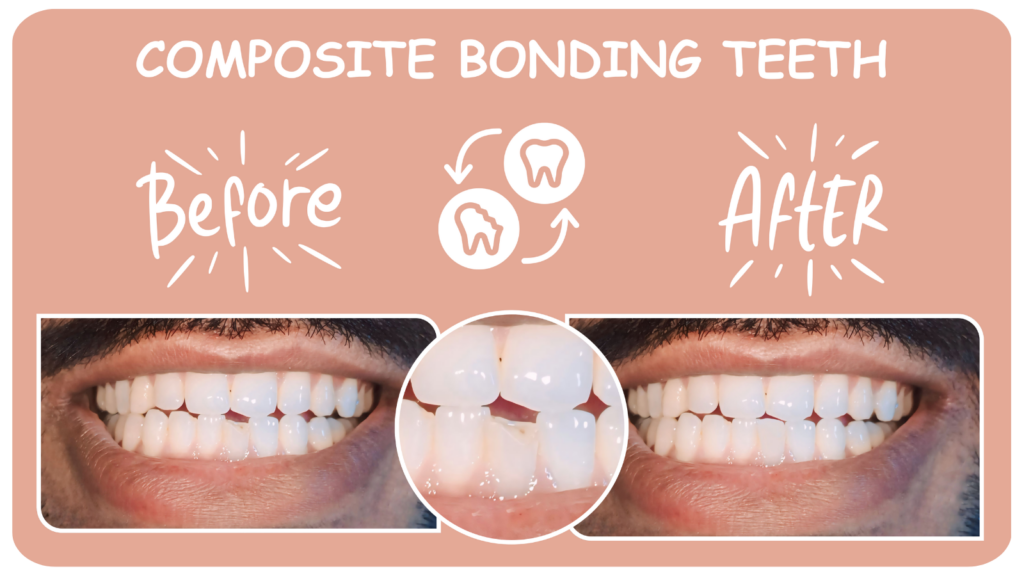Composite Bonding Teeth in bury st edmunds

What is Composite Bonding Teeth?
Composite bonding teeth, also referred to as dental bonding, is a cosmetic dental treatment that can greatly improve the appearance of your smile. It entails applying a tooth-colored composite resin material to the teeth to fix small issues like chips, cracks, spaces, and discoloration. This treatment is favored due to its non-invasive nature, affordability, and the quick outcomes it offers.
Composite bonding teeth is a popular choice for those looking to enhance their smile without undergoing extensive procedures. The composite resin material used in this treatment is carefully matched to the color of your natural teeth, ensuring a seamless and natural-looking result. Additionally, composite bonding is a relatively quick procedure that can typically be completed in just one visit to the dentist.
One of the key benefits of composite bonding is its versatility. Not only can it address minor imperfections in the teeth, but it can also be used to reshape and contour the teeth for a more harmonious smile. Whether you have a small chip or gap that bothers you, or you simply want to brighten and rejuvenate your smile, composite bonding can help you achieve the results you desire.
Furthermore, composite bonding is a conservative option that preserves the natural structure of the teeth. Unlike procedures like veneers or crowns, which require the removal of a significant amount of tooth enamel, composite bonding involves minimal alteration to the teeth. This makes it a great choice for those who want to improve their smile without sacrificing the health and integrity of their natural teeth.
Overall, composite bonding teeth is a safe, effective, and affordable way to enhance the appearance of your smile. If you are looking to address minor cosmetic issues and achieve a more confident smile, consider scheduling a consultation with your dentist to see if composite bonding is right for you.
Introduction to Composite Bonding Teeth
Tooth bonding with composite materials is a dental treatment that is becoming increasingly popular for its adaptability and success. Whether your goal is to repair a cracked tooth or enhance the look of your smile, tooth bonding provides a convenient option. However, what does this procedure entail, and what advantages does it bring to your oral health?
Understanding How Composite Bonding Teeth Works
The procedure for composite bonding teeth usually encompasses a series of steps, each crucial for achieving the desired results:
Initial Consultation and Evaluation: The journey starts with a meeting with your dentist, who will inspect your teeth and talk about your aesthetic desires. They will decide if composite bonding is the most suitable solution for your situation.
Teeth Preparation: Composite bonding stands out from other dental enhancements because it needs little to no preparation. The dentist might lightly roughen your teeth’s surface to make sure the resin sticks well.
Placement of the Tooth-Colored Resin: The dentist meticulously places the resin that matches the color of your teeth in the areas that need improvement. The resin is flexible, enabling the dentist to mold it to fit the natural shape of your teeth.
Resin Hardening: A unique light is employed to solidify the resin. Once it’s set, the composite material securely bonds to your tooth.
Final Adjustments and Polishing: After the resin has set, the dentist will buff the tooth to make it look naturally shiny and smooth. Any needed tweaks are made to ensure your bite is comfortable.
Benefits of Composite Bonding Teeth
Composite bonding teeth provide a range of benefits, making it a favored option for individuals seeking to enhance their appearance:
Fast and Easy: The treatment is typically finished in a single appointment and is usually pain-free, often not requiring any numbing.
Affordable: When compared to other cosmetic treatments like veneers or crowns, composite bonding is more budget-friendly.
Instant Outcomes: You can leave the dental clinic with a better smile on the same day the treatment is done.
Flexibility: Composite bonding can fix a variety of cosmetic problems, such as chips, cracks, spaces, and discoloration.
Minimal Alteration: The treatment requires little change to your natural teeth, keeping your original tooth structure intact.
Drawbacks to Consider
While composite bonding teeth offer many benefits, there are some drawbacks to consider. One potential downside is that the composite material used in bonding may not be as durable as other options like veneers or crowns.
This means that the bonding may need to be repaired or replaced more frequently. Additionally, composite bonding is not as stain-resistant as other materials, so it may require more frequent touch-ups to maintain its appearance. It’s also important to note that composite bonding may not be suitable for all cosmetic issues, as more severe cases may require a different treatment approach.
Overall, while composite bonding is a popular and cost-effective option for improving your smile, it’s important to weigh the pros and cons before making a decision.Although composite bonding for teeth offers numerous advantages, it’s crucial to understand its downsides:
Longevity: Composite bonding might not endure as long as alternative dental treatments such as crowns or veneers. It could chip or discolor over time and might need to be redone.
Fading Resistance: The material in composite bonding is more likely to become discolored by food, beverages, and tobacco compared to natural teeth.
Not Recommended for Severe Damage: Composite bonding is best for small aesthetic improvements. For significant dental problems, other methods might be more suitable.
Who Should Consider Composite Bonding Teeth?
Composite bonding is a great option for individuals looking to make minor cosmetic improvements to their teeth. It is ideal for those with small chips, cracks, gaps, or discoloration that they want to address.
Additionally, composite bonding is a good choice for patients who want a more affordable alternative to crowns or veneers. It is a quick and relatively painless procedure that can be completed in just one visit to the dentist.
Overall, if you are looking to enhance the appearance of your smile without breaking the bank, composite bonding may be the right choice for you.Individuals with minor cosmetic dental issues might find composite bonding teeth a suitable solution.
This method is perfect for those with healthy teeth and gums looking to fix minor flaws. However, it’s important to seek advice from a dentist to see if this treatment is the best fit for your unique needs.
In conclusion, composite bonding teeth provide a fast, efficient, and cost-effective solution for improving your smile. Whether you’re facing chipped teeth, small spaces between teeth, or discoloration, this treatment can deliver quick and rewarding outcomes.
It’s vital to consider the advantages and possible disadvantages of any dental procedure and to consult with a professional to confirm it’s the best option for you.








